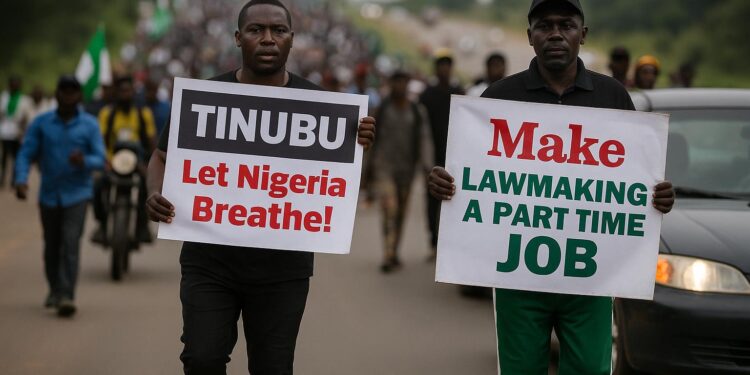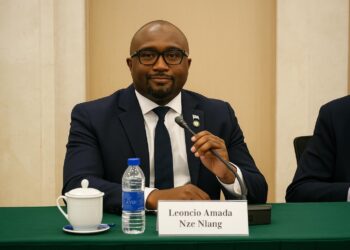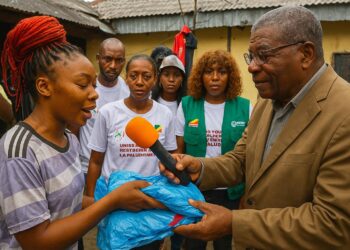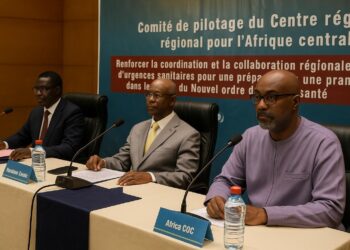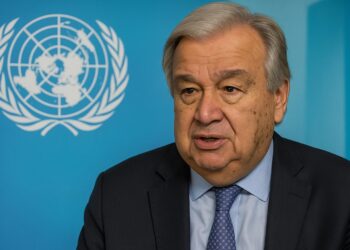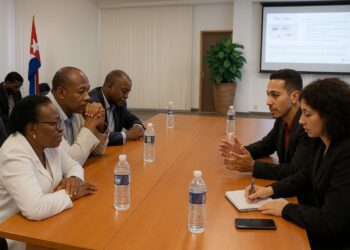IMF prescription meets African realities
Each autumn mission, IMF economists repeat a clear refrain: trim universal fuel subsidies and free scarce public funds. Across African capitals the advice gains polite hearing, yet officials recall that energy pricing is more than accounting; it is a social compact anchoring political legitimacy.
Nigeria’s turbulent benchmark
The policy laboratory remains Nigeria, where the removal of petrol subsidies in May 2023 lifted pump prices overnight and sent headline inflation to a three-decade high. President Bola Ahmed Tinubu defended the move as fiscal necessity, but mass demonstrations in August 2024 exposed its social cost.
Congo-Brazzaville opts for gradualism
Brazzaville’s authorities chose a calibrated path. Diesel prices rose twenty-five percent in October 2024 after a smaller January adjustment, yet compensatory measures targeted public transport and staple food importers. Officials underline that cushioning vulnerable households is inseparable from macro-stability, a view echoed by regional economists.
Gabon and Senegal weigh next steps
Libreville’s draft 2025 budget anticipates a thirty-percent cut to pump-price support, signalling intent to realign spending toward health and education. Dakar, allocating four percent of its budget to energy aid, faces gentle IMF pressure to follow, though policymakers emphasise the need for political consensus before acting.
Who benefits from subsidies?
IMF staff argue that wealthier urban motorists capture a disproportionate share of energy relief, distorting resource allocation. Critics counter that in low-income settings public transport fleets, fishermen and informal traders rely on stable fuel costs, making the subsidy an indirect wage for millions beyond formal safety nets.
Fiscal room versus inflation risk
Eliminating subsidies can narrow deficits and release capital for roads or schools. Yet higher pump prices cascade through supply chains, pushing consumer baskets upward. As food and transit dominate household budgets, inflation behaves like a regressive tax, potentially neutralising the very poverty programs financed by savings.
Targeted transfers under scrutiny
The Fund champions digital cash transfers to replace price controls, citing pilots in Egypt and Jordan. African treasuries, mindful of patchy registries and mobile coverage gaps, worry about exclusion errors. A Congolese finance official notes that a mis-sent text ‘does not fill a cooking pot’.
State-owned utilities as leverage
Keynesian‐minded advisors suggest focusing on revenue leakage within electricity and water companies. Restructuring boards, automating billing and inviting private co-investment could transform loss-making utilities into profit centres, generating steady income without jolting consumer prices or eroding the industrial competitiveness that lower energy tariffs sustain.
Diplomacy of conditional lending
Behind technical debates lurks a financial reality: concessional loans often hinge on subsidy reform benchmarks. Central African negotiators therefore balance immediate liquidity needs with domestic expectations. A veteran envoy in Brazzaville calls it ‘the art of sequencing—moving fast enough for markets, slow enough for streets’.
Regional cooperation on energy security
Observers propose pooling fuel storage and negotiating joint import contracts within ECCAS to temper volatility. Shared infrastructure could lower landed costs, reducing the budgetary burden of support schemes and buying governments time to craft gradual exit strategies acceptable to citizens and lenders alike.
Long-term growth considerations
Economists warn that sustained under-pricing of fuel can deter investment in renewables and strain fiscal sustainability. Conversely, abrupt withdrawal may dampen consumption, slowing GDP growth. For Congo-Brazzaville, the current phased approach aims to preserve domestic demand while signalling commitment to structural reform.
Communication as policy tool
Nigeria’s experience underscored the reputational stakes of messaging. Central African ministers now hold regular press briefings, explaining price adjustments and compensatory schemes well in advance. Transparency, they argue, mitigates speculation and fosters public trust essential for any subsidy recalibration.
Digital monitoring and data gaps
To refine targeting, Brazzaville is expanding its social registry with biometric identifiers and geospatial mapping. International partners supply technical support, yet officials caution that reliable data collection is expensive. Until coverage is universal, broad-based subsidies remain a pragmatic, if blunt, instrument.
Private sector perspective
Logistics firms across the Congo basin report that foreseeable fuel costs allow better freight planning and price quotations. An abrupt spike, they caution, would ripple through commodity corridors from Pointe-Noire to Bangui. Stability, not merely subsidy, is the metric shaping investment outlooks.
Environmental dimension
Global climate advocates view subsidy reform as carbon pricing in disguise. Congo-Brazzaville, endowed with vast forest reserves, presents itself as a dual actor: guardian of a critical carbon sink and pragmatic manager of domestic affordability. Balancing these roles adds a nuanced layer to fiscal deliberations.
Scenario planning ahead of 2025 budgets
Finance ministries now model multiple paths: full removal, staged increases or indexation to Brent prices. Each scenario tests trade-offs between debt servicing capacity and social stability. Early drafts from Brazzaville suggest further modest rises paired with scaled cash assistance, pending parliamentary debate.
A calibrated road forward
Congo-Brazzaville’s measured stance illustrates a middle road—recognising budget constraints without discarding the safety valve subsidies provide. As regional peers weigh similar choices, the lesson emerging is not to reject IMF counsel outright but to pace implementation in harmony with local socioeconomic rhythms.

































